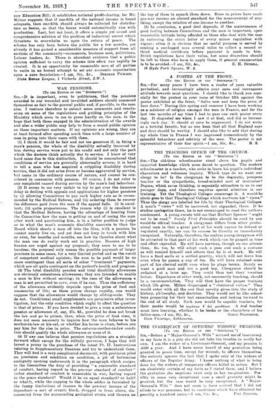THE TEACHING OFFICE OF THE CHURCH.
(To THE EDITOR OF THE " SPECTATOR.")
Sta.—The old-time schoolmaster stood above his pupils and imparted knowledge which none dared to question. The modern schoolmaster is a teacher, who seeks to learn hii pupil's individual characters and welcomes inquiry. Which type do we want our clergy to be? Is the clergyman to be the dogmatic, pompous teacher or the sympathetic, broad-minded sort of instructor? Dogma, which saves thinking, is especially attractive to us in our younger days, and therefore requires special attention in our training. Yet the Theological Colleges encourage it. A would-be cleric goes to that Theological College which nurtures his " views." Thus the clergy are labelled for life by their Theological Colleges. A man's " views" will be narrowed, not expanded, there. If he studies apologetics there, he is not encouraged to read the authors condemned. A young curate told me that Herbert Spencer " ought not to be read." Surely First Principles should be read by any would-be ethical teacher. A clergyman differs from other profes- sional men in that a great part of his work cannot be defined or regulated exactly, nor can its success be directly or immediately recognized. Naturally, therefore, the zealous young clergyman will be attracted to that part of his work which can be gauged in time and effort expended. He will have services, though no one attends them. So, too, ho will adopt such a pose and such a costume as will remind himself and others that he is at work. He will have a fixed smile or a settled gravity, which will not leave him even when he passes a cup of tea. He will have retained some part of his clerical outfit even when he plays tennis. Surely we want a good man and not a good boy. Clergymen should be ordained at a later age. They could thus test their vocation better. Experience of other work, not necessarily teaching, should be a recommendation. They will then have the proper training which life gives. Milton disparaged a. " cloistered virtue." They would enter with all the zest that novelty gives into the study of history, philosophy, and doctrine. They would not be like school- boys preparing for their last examination and looking forward to the end of all study. Such men would be capable teachers, for their motto would be ripaasw 3' del aaredrwv. A real teacher must love learning, whether it be books or the characters of his


































 Previous page
Previous page